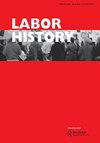社会主义移民的理论与过程:1975-1985年越南与保加利亚关系中的地方敌意与国际友谊
IF 0.7
4区 管理学
Q1 HISTORY
引用次数: 0
摘要
摘要本文探讨了后殖民国家和社会主义国家之间的劳动力交换计划,作为一种道德经济形式,试图调和社会主义国际主义和“互利”移民的概念。文章聚焦于越南和保加利亚之间的关系,追溯了社会主义移民和国际主义的关键逻辑,这些逻辑影响、打破和重塑了不同团结单位之间的关系。其中包括党、群众组织和经济企业之间的联系;经济单位、政治组织和外籍工人之间;主要是在越南和保加利亚这两个国家之间。文章认为,经济企业和部委与保加利亚共产党中央委员会和外国工人之间对国际主义含义的不断重新谈判,产生了两个相互竞争的逻辑,即从后殖民国家进口劳动力是否具有政治价值。为了探究这场冲突,我把注意力集中在1975年至1985年之间的几年里,当时一些声音要求停止劳动力交换计划。尽管如此,在此期间,抵达保加利亚的越南工人人数增加了两倍多。本文进入社会主义国际主义理论与移民社会实践互动的空间,使国际主义成为一个开放的领域。本文章由计算机程序翻译,如有差异,请以英文原文为准。
Theory and process of socialist migration: local enmities and international friendships in the Vietnam-Bulgaria relations (1975-1985)
ABSTRACT The essay explores the labor-exchange programs between postcolonial and socialist states as a form of moral economy that attempted to reconcile the notions of socialist internationalism and ‘mutually beneficial’ migration. Focusing on the relationship between Vietnam and Bulgaria, the article traces key logics of socialist migration and internationalism that informed, broke, and reshaped the relationships between different units of solidarity. These include links between the Party, mass organizations, and economic enterprises; between economic units, political organizations, and foreign workers; and essentially between the two countries, Vietnam and Bulgaria. The essay contends that the constant renegotiation of the meaning of internationalism between economic enterprises and ministries, on the one side, and the Central Committee of the Bulgarian Communist Party and foreign workers, on the other, produced two competing logics on whether labor-import from postcolonial states was politically valuable. To explore the clash, I concentrate on the years between 1975–1985, when some voices required the halt of labor exchange programs. This notwithstanding, in this period, the number of Vietnamese workers to arrive in Bulgaria more than tripled. The essay enters the spaces where socialist internationalist theory and the social practice of migration interacted, to make internationalism an open-ended domain.
求助全文
通过发布文献求助,成功后即可免费获取论文全文。
去求助
来源期刊

Labor History
Multiple-
CiteScore
1.00
自引率
28.60%
发文量
44
期刊介绍:
Labor History is the pre-eminent journal for historical scholarship on labor. It is thoroughly ecumenical in its approach and showcases the work of labor historians, industrial relations scholars, labor economists, political scientists, sociologists, social movement theorists, business scholars and all others who write about labor issues. Labor History is also committed to geographical and chronological breadth. It publishes work on labor in the US and all other areas of the world. It is concerned with questions of labor in every time period, from the eighteenth century to contemporary events. Labor History provides a forum for all labor scholars, thus helping to bind together a large but fragmented area of study. By embracing all disciplines, time frames and locales, Labor History is the flagship journal of the entire field. All research articles published in the journal have undergone rigorous peer review, based on initial editor screening and refereeing by at least two anonymous referees.
 求助内容:
求助内容: 应助结果提醒方式:
应助结果提醒方式:


